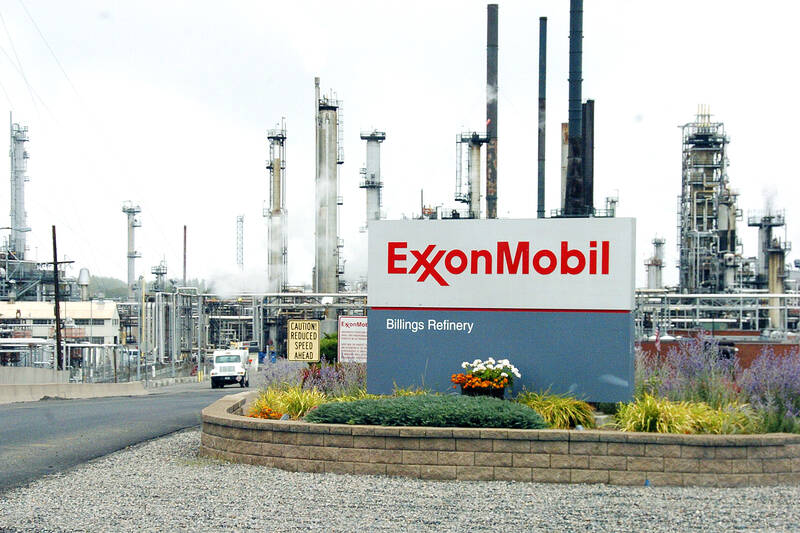ExxonMobil publicly downplayed climate change despite scientists for the oil giant accurately predicting global warming from fossil fuels as far back as the late 1970s, according to a study published on Thursday.
“They modelled and predicted global warming with shocking accuracy and skill, only for the company to spend the next couple of decades denying that very climate science,” said Geoffrey Supran, a coauthor of the study published in the journal Science.
ExxonMobil, formed in a 1999 merger between Exxon and Mobil Oil, has faced accusations for years that it knew about the threat of global warming decades ago.

Photo: AP
Inside Climate News and the Los Angeles Times first revealed in 2015 that ExxonMobil was aware for a long time that climate change was happening and was the result of human activity.
The company is the target of a number of lawsuits in the US, several of which are ongoing, along with an activist campaign tagged “Exxon Knew.” The European Parliament and US Congress have held hearings into the oil behemoth.
“I see this as ‘Exxon Knew 2.0,’” Supran said of his research, performed while he was at Harvard University.
He said the study for the first time compared the findings of ExxonMobil’s own scientists to what other climate researchers knew at the time, and to what has subsequently occurred.
“They didn’t just vaguely know something about global warming decades ago,” Supran said. “They knew as much as independent, academic and government scientists did, and arguably, they knew what they needed to know to begin to take action and warn the public.”
Supran, who now teaches at the University of Miami, said he and his coauthors from Harvard and the Potsdam Institute for Climate Impact Research had analysed private ExxonMobil graphs and tables that had never been scrutinised before.
“Our analysis truly seals the deal on what Exxon knew and literally puts a number on it,” he said.
The researchers analyzed 32 internal documents produced by ExxonMobil scientists between 1977 and 2002. The documents contained 16 global mean temperature projections linked to a rise in atmospheric greenhouse gas concentrations.
“Overall, ExxonMobil’s global warming projections closely track subsequent observed temperature increases,” the study said.
Ten of the 16 projections are “consistent with historical observations,” while two forecast more warming than observed, it said.
On average, the ExxonMobil scientists predicted average warming of 0.2°C per decade, equivalent to the current rate.
However, Gavin Schmidt, director of the NASA Goddard Institute for Space Studies, said tackling climate change must involve much more than just “naming and shaming” the oil companies.
“It isn’t as if we could just turn around and say, ‘ExxonMobil stop producing fossil fuels,’ and then we’d solve the problem,” Schmidt said. “All those products are being used by people and by industries, and by cities and other infrastructure.”

Thousands gathered across New Zealand yesterday to celebrate the signing of the country’s founding document and some called for an end to government policies that critics say erode the rights promised to the indigenous Maori population. As the sun rose on the dawn service at Waitangi where the Treaty of Waitangi was first signed between the British Crown and Maori chiefs in 1840, some community leaders called on the government to honor promises made 185 years ago. The call was repeated at peaceful rallies that drew several hundred people later in the day. “This government is attacking tangata whenua [indigenous people] on all

RIGHTS FEARS: A protester said Beijing would use the embassy to catch and send Hong Kongers to China, while a lawmaker said Chinese agents had threatened Britons Hundreds of demonstrators on Saturday protested at a site earmarked for Beijing’s controversial new embassy in London over human rights and security concerns. The new embassy — if approved by the British government — would be the “biggest Chinese embassy in Europe,” one lawmaker said earlier. Protester Iona Boswell, a 40-year-old social worker, said there was “no need for a mega embassy here” and that she believed it would be used to facilitate the “harassment of dissidents.” China has for several years been trying to relocate its embassy, currently in the British capital’s upmarket Marylebone district, to the sprawling historic site in the

A deluge of disinformation about a virus called hMPV is stoking anti-China sentiment across Asia and spurring unfounded concerns of renewed lockdowns, despite experts dismissing comparisons with the COVID-19 pandemic five years ago. Agence France-Presse’s fact-checkers have debunked a slew of social media posts about the usually non-fatal respiratory disease human metapneumovirus after cases rose in China. Many of these posts claimed that people were dying and that a national emergency had been declared. Garnering tens of thousands of views, some posts recycled old footage from China’s draconian lockdowns during the COVID-19 pandemic, which originated in the country in late

BACK TO BATTLE: North Korean soldiers have returned to the front lines in Russia’s Kursk region after earlier reports that Moscow had withdrawn them following heavy losses Ukrainian President Volodymyr Zelenskiy on Friday pored over a once-classified map of vast deposits of rare earths and other critical minerals as part of a push to appeal to US President Donald Trump’s penchant for a deal. The US president, whose administration is pressing for a rapid end to Ukraine’s war with Russia, on Monday said he wanted Ukraine to supply the US with rare earths and other minerals in return for financially supporting its war effort. “If we are talking about a deal, then let’s do a deal, we are only for it,” Zelenskiy said, emphasizing Ukraine’s need for security guarantees